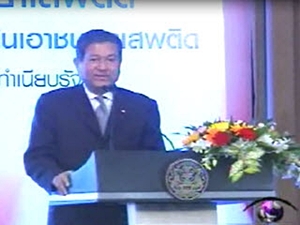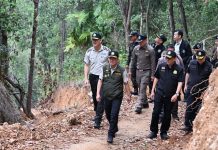BANGKOK, Feb 4 — Deputy Prime Minister Chalerm Yubumrung on Saturday said the government has planned to upgrade the ‘war on drugs’ from a national agenda to a regional one, as he would discuss the illicit drug problem with his counterparts in the Association of Southeast Asian Nations (ASEAN) later this month.
Mr Chalerm, in his capacity as Director of the National Command Center for Drugs (NCCD), told a press conference that he and his counterparts from ASEAN were scheduled to hold an anti-narcotics meeting later this month, during which illicit drugs are expected to be upgraded to a regional agenda.

He was also scheduled to hold talks with the Myanmar ambassador on cooperation to crack down on drug trafficking along the border.
The deputy premier said the army would help erect barbed-wire fences along the northern border, as 87 percent of illicit drugs were smuggled through eight border provinces, particularly Chiang Rai, Mae Hong Son and Chiang Mai.
Mr Chalerm said Thailand could not achieve this mission alone, but needed cooperation from neighbouring countries, and focus should be placed on reducing sources and demand for drugs by seriously cracking down on dealers and intercepting narcotics ingredients.
He said officials were studying the law to legally tap telephones of inmates who may involved in drug trafficking in order to gather information to wipe out drug syndicates.
The government has conducted successful drug bust operations over the past four months, Mr Chalerm said, adding that 16.49 million pills of methamphetamine were seized, nearly 600 kg of crystal meth or ice, 3,400 kg of marijuana, while Bt632.86 million worth of assets and cash were also seized.
He added that the government has no policy of preemptive killings, but that drug dealers may kill their own colleagues to cut their ties and prevent authorities from finding clues and witnesses to arrest them.
Mr Chalerm also urged the media to join in the operation by publicising that the drug problem was an international scourge that needed cooperation from ordinary citizens.
He added that, according to figures compiled by the United Nations, that the number of drug abusers is estimated at 210 million worldwide.




